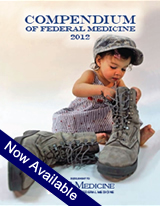Late Breaking News
2012 Compendium
Caffeine Shows Promise in Saving Lives of Brain Injured
- Categorized in: Department of Defense (DoD), February 2012, PTSD
By Sandra Basu
WASHINGTON — The common chemical stimulant available in a cup of coffee or some soft drinks may hold promise for saving the lives of brain-injured troops.
A recent preliminary study published in the journal Experimental Neurology suggests that a high dose of caffeine may be able to help prevent death in cases of serious traumatic brain injury if given immediately after the injury.1
The U.S. Army Medical Research and Materiel Command’s Telemedicine and Advanced Technology Research Center funded the animal study.
“If future studies would prove that this is, indeed, the case in not only rats but in other animals and models and eventually in humans, that would open doors for improving acute care after traumatic brain injury by introducing caffeine as kind of the weapon of first employment after acute TBI,” Eugene Golanov, MD, PhD, portfolio manager for Neuroscience at the Telemedicine and Advanced Technology Research Center, told U.S Medicine.
Caffeine Study
For the study, researcher Detlev Boison, PhD, and his colleagues at the Legacy Research Institute in Portland, OR, hypothesized that both acute mortality and posttraumatic chronic consequences triggered by a severe brain injury “might be influenced by an acute surge of adenosine.” If this is the case, then blocking adenosine with caffeine, which is an adenosine receptor antagonist, would “be able to protect against both acute as well the chronic consequence of TBI,” they reasoned.
The researchers used a rat lateral fluid percussion injury model of severe TBI with an acute mortality rate of 46.7%. A subset of rats was treated with 25mg/kg caffeine intraperitoneally within 1 minute of the injury.
One of the main findings was that a single acute dose of 25 mg/kg of caffeine, given immediately following a severe brain injury in rats, prevented an acute lethal outcome under conditions that otherwise resulted in a 40% mortality rate. An adenosine surge is responsible for causing prolonged apnea, which is the major cause of death after a severe brain injury. The data suggested that caffeine may be able to counteract that surge of adenosine.
“Our results are the first to demonstrate that caffeine limits apnea duration and prevents mortality when administered rapidly following severe TBI, without negative consequences,” the researchers wrote. “As apnea is a major cause of pre-hospital mortality, this finding presents a major therapeutic opportunity for first responders in both civilian and military environments.”
The researchers also demonstrated that neuromotor function was not affected by caffeine treatment in the rats at either 24 hours or 4 weeks following the injury. In addition, they demonstrated that a single post-injury dose of caffeine “can have long-lasting effects on electrographic burst durations, indicating that caffeine might beneficially influence processes involved in posttraumatic epileptogenesis, an interesting observation that warrants further experimentation.”
Caffeine
Golanov noted that caffeine is a commonly consumed substance and has already been studied and developed to improve war fighters’ performance and to mitigate the consequences of sleep deprivation.
“Caffeine is a fairly safe drug for humans,” he said. “For humans, a lethal dose is over 10 grams consumed at the same time. While with a cup of coffee we maybe get 100 mg. If you think about possible damaging effects of caffeine, you maybe have to drink 200 cups of coffee at the same time.”
This particular study is interesting, Golanov said, because it addresses the problem of prolonged apnea, which is a major cause of death after a severe brain injury.
Further study is needed on its impact on severe TBI, but Boison said that if caffeine eventually proved successful in helping humans with severe brain injury, a first responder may be able to administer the caffeine immediately by injection.
“The TBI patient would not be able to swallow it, the first responder would need to inject it immediately,” he told U.S. Medicine.
Boison also said he believes there could be broader applicability of caffeine to help other conditions, such as sudden unexpected death in epilepsy (SUDEP) and SIDS.
“We recently published a study on SUDEP, where we demonstrate the protective effect of caffeine,” he said. Boison said that the SUDEP project is ongoing and that they hope to secure funding to continue with that line of research.
He and his colleagues plan to continue their research on caffeine and TBI. During the next project phase, they plan to study the effect of different doses and time points of administration of caffeine on lethal outcome after TBI. They also plan to study the effects of specific adenosine receptor antagonists. In addition, they would like to assess the contribution of sleep restriction prior to the injury on outcome. Finally, he said they plan to include long-term follow-up studies to assess long-term consequences of TBI after caffeine intervention such as cognitive function, posttraumatic epilepsy, and PTSD.
Comments (2)
Email to Friend
Fill in the form below to send this article to a friend:
Survey
Has the VA provided enough resources to make the MOVE! weight-loss initiative successful?




